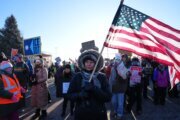Some of the most at-risk people in the United States are getting their first dose of coronavirus vaccine as soon as this week, while other people are absorbing the quickly-evolving information about the shots that aim to prevent the spread of COVID-19.
With the Food and Drug Administration poised to approve emergency usage of a second vaccine, made by Moderna, Dr. David Goodfriend, the health director in Virginia’s Loudoun County, took questions in a Facebook Live event on Thursday.
One of the questions focused on the timing of the booster shots, in particular, what would be the ramifications if lack of vaccine or a weather or personal emergency delayed the second shot.
“The expectation is, as with most vaccines that have boosters, it’s a minimum spacing,” said Goodfriend.
“In this case you have to have at least 28 days,” for the Moderna vaccine or 21 days for the Pfizer vaccine.
Patients will need to take both doses of the same brand vaccine, since there are differences.
“If it’s 30 or 40 days, that’s usually not an issue,” said Goodfriend. “That said, assuming we have that vaccine in stock at the time, you don’t want to delay it too long, because that booster shot is critical to get up to that 95% or more effectiveness.”
Even after getting both doses, Goodfriend said mask-wearing, staying physically apart, and hand-washing will still be needed for several months, until enough people have been vaccinated, and herd immunity results in the coronavirus no longer being spread in the county.
- Sign up for WTOP alerts
- Latest coronavirus test results in DC, Maryland and Virginia
- Coronavirus vaccine FAQ: What you need to know
- COVID Christmas: How Catholic churches in the DC area are handling the holiday
- Maryland urges smaller gatherings, advises against holiday travel
- 2nd COVID-19 vaccine set for OK in US with panel endorsement
Looking for more information? D.C., Maryland and Virginia are each releasing more data every day. Visit their official sites here: Virginia | Maryland | D.C.








